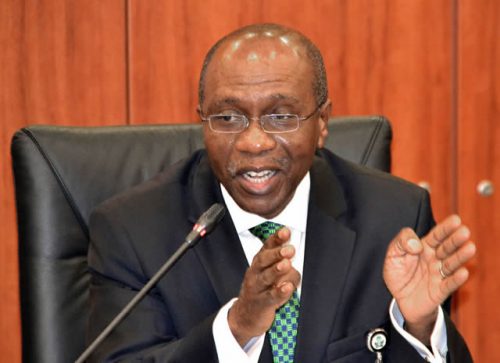The Governor of the Central Bank of Nigeria (CBN), Godwin Emefiele, has identified the adoption of risk-focused and rule-based regulatory framework, zero tolerance in regulatory framework for data/information rendition/reporting and infractions, and strict enforcement of corporate governance principles in banking sector as critical to achieving a stable banking system in the country.
The apex bank governor was quoted in a statement to have made this remark at the 2018 Financial Markets Conference with the theme ‘The Nigerian financial market – A catalyst for sustainable economic-growth’, which was organised by the Financial Market Dealers Association of Nigeria in Lagos.
The banking expert noted further that timely process for rendition of returns by banks and other financial institutions through e-FASS application software, revision and updating of relevant laws for effective corporate governance and ensuring greater transparency and accountability in the implementation of banking laws and regulation had help in enhancing bank customers’ confidence in the sector in recent years.
Emefiele, who was represented at the forum by the CBN Executive, Mrs. Olatoun Akinola, listed a key initiative that contributed to the strengthening the financial market to moderate illiquidity after the global financial crisis as the establishment of a resolution vehicle (Asset Management Corporation of Nigeria) in 2010.
He expatiated: “Let me mention the ‘Alpha Project Initiative’ which brought about the ‘new banking model’ structure that replaced the hitherto one-size-fits-all model of banking. This new model resulted in the establishment of international banks, national banks, regional banks and specialised banks.”
The CBN Governor explained that the regulatory initiatives had impacted positively on the banking sector, leading to many Nigerian banks being ranked among key players in the global financial landscape with some of them featuring among the first 20 banks in Africa and among top 1,000 banks globally.
In addition, he noted that the measures had robbed on positively on the nation’s capital market performance, pointing out that “take for instance, since the aftermath of the effect of the global financial crisis on the capital market, the apex regulator in the capital market has stepped up its surveillance activities and initiated different programmes.”
In his remarks at the event, the FMDA President, Samuel Ocheho, assured that the group would continue to play a major role in promoting the nation’s economic growth through well informed advice and contributions to national policy contents at all times.






